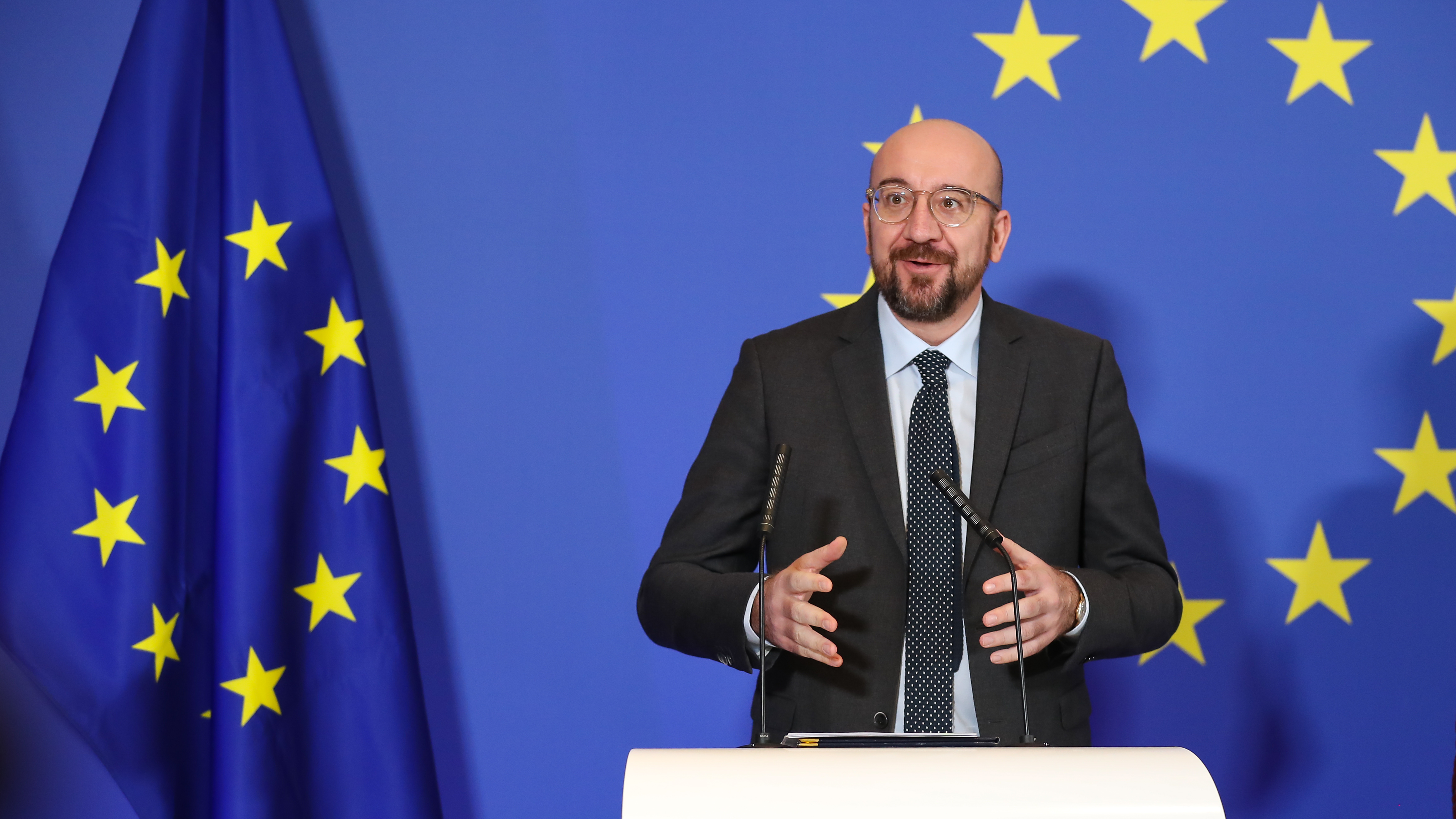
European Council President Charles Michel delivers a speech during a ceremony at the House of European History in Brussels, Belgium, December 1, 2019. /Xinhua
European Council President Charles Michel delivers a speech during a ceremony at the House of European History in Brussels, Belgium, December 1, 2019. /Xinhua
Editor's note: Richard Fairchild is an associate professor at the University of Bath School of Management. The article reflects the author's opinions and not necessarily the views of CGTN.
On June 19 the European Council (EC), led by its president, Charles Michel, meet via video-conference to discuss plans for a recovery fund in response to the COVID-19 crisis, and a new long-term budget for the EU.
The video meeting was the culmination of some initial preparation groundwork. On April 23, European leaders decided that the EC would work towards establishing this recovery fund, and linked it towards the EU's long-term budget. The proposal was presented on May 27.
In my opinion, this is both a practical and symbolic move by the EU-leaders to demonstrate unity among member nations in these extremely challenging and unprecedented times.
As they noted in their statement, the COVID-19 pandemic has been a very testing and challenging time for "our societies and economies... the public health emergency rapidly turned into the most drastic economic crisis in the EU's history.... it was clear that the recovery would require a joint effort at EU level."
This statement captures a couple of ongoing themes in this crisis.
First, COVID-19 has caused both a massive global health catastrophe, but also had a hugely damaging effect on the global economy. Methods and policies of recovery need to consider both effects. How can we kick-start and stimulate the economy while minimizing the future spread of COVID-19?
In lockdown, this has been an issue that all nations are grappling with. The temporary closure of businesses, non-essential shops, lack of investment, thousands of workers working at home or furloughed... this has both slowed down the spread of the virus and saved lives, but it has also led to the biggest world recession since the 2008 Financial Crisis, with the global economy crashing by more than 20 percent in GDP terms.
Furthermore, there is a fear that, as a result of COVID-19, many businesses will go into bankruptcy and many workers will face mass redundancies. The policy trade-off facing individual nations has been when and how to ease societal restrictions (lockdown, social distancing etc) to re-start and boost the economy, while minimizing the risk of a second wave of the pandemic.
As a strong example of this dilemma, in the UK, we are planning to re-open a staple of UK society: the British pub. Prime Minister Boris Johnson is currently grappling with the social distancing rules. If we stick with the current two-meter rule, then approximately only thirty percent of British pubs will be able to re-open in July. Others will be too small to do so.
The prime minister is considering reducing the social distancing rule to one meter: then some smaller pubs will be able to open: It is estimated that this simple reduction in the social distancing rule could increase pub re-opening to seventy percent of all establishments.
This will obviously have a huge positive effect on businesses, jobs, livelihoods and the UK economy. But what about the COVID infection rate? This is potentially a huge economic-health trade-off.
Interestingly, beyond politics, science plays a part here: The R-number (the COVID-19 re-infection rate) is a crucial input into the decision-making process. The government listens to the scientists (sometimes!) in making these difficult decisions.

A man walks past posters encouraging people to have faith during the coronavirus outbreak in London, Britain, April 30, 2020. /Xinhua
A man walks past posters encouraging people to have faith during the coronavirus outbreak in London, Britain, April 30, 2020. /Xinhua
The second theme that the EU statement captures, in my opinion, is the following: It emphasizes the importance of nations working together and cooperatively to help each other through crises, such as the COVID-19 pandemic.
Since the 2016 referendum, Britain has been grappling with whether, and how to Brexit the EU. Many believed, and it was my opinion, that, for all of its faults, it was better for us to remain in the EU as a strong political and economic cooperative bloc: This would give us strength in unity in the face of extreme troubles and crises.
It appears somewhat ironic that we officially left the EU at the end of January 2020, at the time that, unbeknownst to us, COVID-19 was just emerging.
As the EU ministers meet online, they will discuss how they can employ the fund to ensure a sustainable economic recovery and achieve cooperative common policy objectives, such as a green and digital transition.
They will also discuss the European Semester (an annual 6-month cycle from the beginning of each year, where the EU nations co-ordinate their economic and fiscal policies). This will be a particularly important discussion this year, given COVID-19.
Where does this leave Britain? Well, the EU and UK held a "high-level" meeting via video conference on June 15 2020: with dignitaries from the EU, including European Council President Charles Michel, and the European Commission's Chief Negotiator, Michel Barnier, talking to UK PM, Boris Johnson.
In this video-conference, it will be reported that, in spite if COVID-19, Britain does not want any extension to the Brexit transition period. Britain still aims to complete withdrawal by December 31, 2020.
It is further noted that four milestones in this transition period had been achieved, and that the chief negotiators agreed to "intensify the talks in July with a view to concluding a ratifying a deal before the end of 2020."
The video meeting of the European Council to discuss the recovery fund is a stepping-stone towards a hoped-for future physical meeting of the Council.
Symbolically, and ironically, at the precise time that the EU is moving towards a unified and cooperative economic and fiscal plan among their countries for dealing with the extremely complex economic and health implications of COVID-19, Britain is pushing on with its plan to Brexit and "go it alone."
It will be interesting to see which approach yields the best results for the economy and for public health over the coming months!
(If you want to contribute and have specific expertise, please contact us at opinions@cgtn.com.)